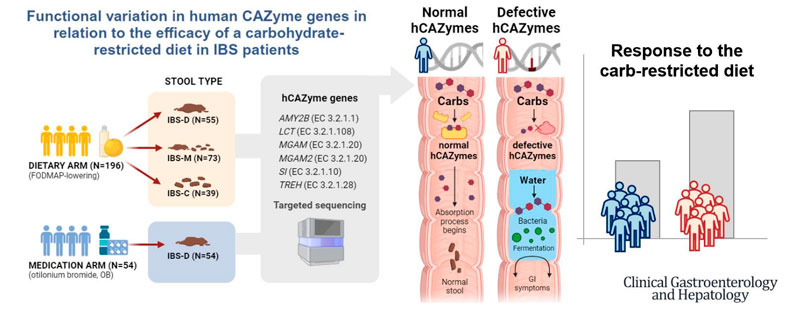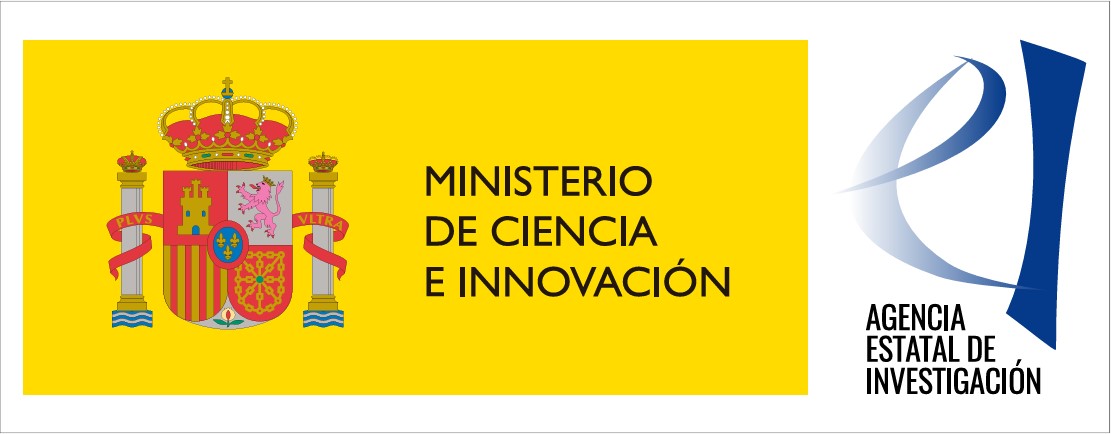
2024/10/14
New study reveals genetic defects in carbohydrate digestion influence diet response in patients with irritable bowel syndrome
Irritable bowel syndrome (IBS) affects up to 10% of the global population and remains challenging to treat due to the wide variation in patient symptoms and responses to dietary or pharmacological interventions.
An international study, recently published in Clinical Gastroenterology & Hepatology, now shows higher efficacy of dietary interventions in IBS patients with genetic defects in carbohydrate digestion.
The research could lead to tailored IBS treatments, using genetic markers to predict which patients benefit from specific dietary interventions.
Irritable bowel syndrome (IBS) is a digestive disorder affecting up to 10% of the global population, characterized by abdominal pain, bloating, diarrhea, or constipation. Despite its prevalence, treating IBS remains a challenge as symptoms and responses to dietary or pharmacological interventions vary significantly.
Patients often connect their symptoms to the consumption of certain foods, especially carbohydrates, and their dietary elimination or reduction has emerged as an effective treatment option, though not all patients experience the same benefits. Nutrigenetics (the science investigating the combined action of our genes and nutrition on human health) has highlighted how changes in DNA can affect the way we process food. A well-known example is lactose intolerance, where the loss of function in the lactase enzyme hinders the digestion of dairy products. Now, a pioneering study published in the journal Clinical Gastroenterology & Hepatology, suggests that genetic variations in human carbohydrate-active enzymes (hCAZymes) may similarly affect how IBS patients respond to a carbohydrate-reduced (low-FODMAP) diet.
Research led by Ikerbasque Research Professor Mauro D’Amato from the Gastrointestinal Genetics Research group at CIC bioGUNE – member of BRTA -, and the Department of Medicine and Surgery at LUM University had been investigating the role of hCAZymes in relation to IBS. Through a large international collaboration (the GenMalCarb consortium) and data from the DOMINO trial, the team now revealed that individuals with hypomorphic (defective) variants in hCAZyme genes are more likely to benefit from a carbohydrate-reduced diet. The study, involving 250 IBS patients, compared two treatments: a diet low in fermentable carbohydrates (FODMAPs) and the antispasmodic medication otilonium bromide. Strikingly, of the 196 patients on the diet, those carrying defective hCAZyme genes showed marked improvement compared to non-carriers, and the effect was particularly pronounced in patients with diarrhea-predominant IBS (IBS-D), who were six times more likely to respond to the diet. In contrast, this difference was not observed in patients receiving medication, underscoring the specificity of genetic predisposition in dietary treatment efficacy.
“These findings suggest that genetic variations in hCAZyme enzymes, which play a key role in digesting carbohydrates, could become critical markers for designing personalized dietary treatments for IBS” comments Mauro D’Amato, senior author of the study. “The ability to predict which patients respond best to a carbohydrate-reduced diet has the potential to strongly impact IBS management, leading to better adherence and improved outcomes”.
In the future, incorporating knowledge of hCAZyme genotype into clinical practice could enable clinicians to identify in advance which patients are most likely to benefit from specific dietary interventions. This would not only avoid unnecessary restrictive diets for those unlikely to benefit but also open the door to personalized medicine in IBS. The research team emphasizes the need for further studies to validate these findings and delve deeper into the biological mechanisms at play. If confirmed, this approach could dramatically improve the treatment of IBS and similar gastrointestinal conditions, making dietary and therapeutic strategies more precise and effective.
The study involved researchers and clinicians from Spain (CIC bioGUNE), Italy (LUM University and University of Naples), Germany (IKMB and University of Veterinary Medicine Hannover), Belgium (TARGID) and UK (University of Nottingham), and received funding from the Spanish Government MCIN/AEI/10.13039/501100011033 (PCI2021-122064-2A), the German Federal Ministry for Education and Research BMBF (01EA2208B and 01EA2208A) and the Medical Research Council MRC (MR/W031213/1), under the umbrella of the European Joint Programming Initiative “A Healthy Diet for a Healthy Life” (JPI HDHL) and of the ERA-NET Cofund ERA-HDHL (GA N° 696295 of the EU Horizon 2020 Research and Innovation Programme), the Spanish Government MCIN/AEI/10.13039/501100011033 (PID2020-113625RB-I00), the German Research Foundation DFG (NA331/13-1 and 390884018), and the Belgian Health Care Knowledge Centre (ref number: 16001).
Reference: Andreea Zamfir-Taranu, Britt-Sabina Löscher, Florencia Carbone, Abdullah Hoter, Cristina Esteban Blanco, Isotta Bozzarelli, Leire Torices, Karen Routhiaux, Karen Van den Houte, Ferdinando Bonfiglio, Gabriele Mayr, Maura Corsetti, Hassan Y Naim, Andre Franke, Jan Tack and Mauro D’Amato. Functional variation in human CAZyme genes in relation to the efficacy of a carbohydrate-restricted diet in IBS patients. Clin Hepatol Gastroenterol DOI: 10.1016/j.cgh.2024.09.004.
About CIC bioGUNE
The Centre for Cooperative Research in Biosciences (CIC bioGUNE), member of the Basque Research & Technology Alliance (BRTA), located in the Bizkaia Technology Park, is a biomedical research organisation conducting cutting-edge research at the interface between structural, molecular and cell biology, with a particular focus on generating knowledge on the molecular bases of disease, for use in the development of new diagnostic methods and advanced therapies.
About Ikerbasque
Ikerbasque - Basque Foundation for Science - is the result of an initiative of the Department of Education of the Basque Government that aims to reinforce the commitment to scientific research by attracting, recovering and consolidating excellent researchers from all over the world. Currently, it is a consolidated organization that has 290 researchers/s, who develop their work in all fields of knowledge.
About BRTA
BRTA is an alliance of 4 collaborative research centres (CIC bioGUNE, CIC nanoGUNE, CIC biomaGUNE y CIC energiGUNE) and 13 technology centres (Azterlan, Azti, Ceit, Cidetec, Gaiker, Ideko, Ikerlan, Leartiker, Lortek, Neiker, Tecnalia, Tekniker y Vicomtech) with the main objective of developing advanced technological solutions for the Basque corporate fabric.
With the support of the Basque Government, the SPRI Group and the Provincial Councils of the three territories, the alliance seeks to promote collaboration between the research centres, strengthen the conditions to generate and transfer knowledge to companies, contributing to their competitiveness and outspreading the Basque scientific-technological capacity abroad.
BRTA has a workforce of 3,500 professionals, executes 22% of the Basque Country's R&D investment, registers an annual turnover of more than 300 million euros and generates 100 European and international patents per year.
Grant PCI2021-122064-2A funded by:

Grant PID2020-113625RB-I00 funded by:

See a large version of the first picture





